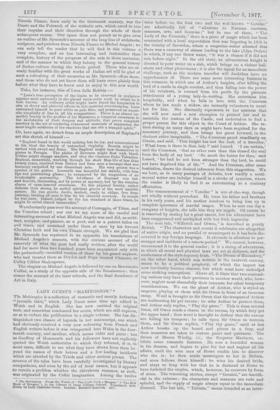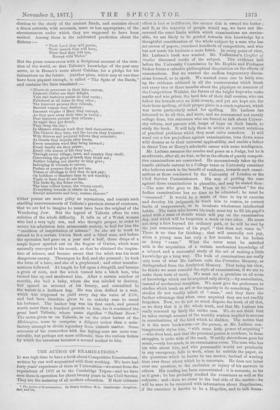LADY GUEST'S " MABINOGION." * • The Mabinogion. From the
Welsh of " The Llyfr Cloch o Hergest " (" Thal:tad Book of 'largest"), In the Library of Jeans College, Oxford. Translated, with "Totes, by Lady Obarlotto Guest. Londoa : Barnard Quaritob. 1877. The Mabinogion is a collection of romantic and mostly Arthurian -"juvenile tales," which Lady Guest some time ago edited in Welsh and in English. She has now omitted the original text, and somewhat condensed her notes, which are still copious, so as to reduce the publication to a single volume. She has dis- tinguished two classes of legends in her manuscript, one which Lad obviously received a very new colouring from French and English writers before it was reimported into Wales in the four- teenth century, and another, which seems older and purer ; but as Geoffrey of Monmouth and his followers have not explicitly .quoted the Welsh authorities to which they referred, it is, in most cases, difficult to see what they have drawn from them be- yond the names of their heroes and a few leading incidents which are attested by the Triads and other ancient poems. The :sources of the tales have been carefully investigated by literary 'comparisons, and even by the aid of local names, but it appears to remain a problem whether the chivalrous romance, as such, was originated by the Celtic imagination. Among the twelve
tales before us, the first two and the well-known " Geraint" are admittedly full of "allusions to Norman customs, manners, arts, and luxuries ;" but in one of them, "The Lady of the Fountain," there is a piece of magic which has been connected with a local superstition that was lingering in 1806 in the vicinity of Snowdon, where a magazine-writer attested that there was a causeway of stones leading to the lake (Llyn Dulyn) in which, if any one threw water, "it was a chance if it did not rain before night." In the old story, an adventurous knight is directed to pour water on a slab, which brings on a violent hail. storm and other phenomena ; it is also the signal for an immediate challenge, such as the modern traveller will doubtless have no apprehension of. There are some more interesting features in this romance, in which one of Arthur's knights, after killing the lord of a castle in single combat, and then falling into the power of his retainers, is rescued from his perils by the platonic attachment of a young lady-in-waiting. She entertains him hospitably, and when he falls in love with the Countess whom he has made a widow, she instantly volunteers to court her for him. She discreetly represents to her mistress that she will now need a new champion to protect her and to maintain the custom of the Castle, and undertakes to find a proper person for this object in the Court of Arthur. She re- tires during as many days as might have been required for the necessary journey, and then brings her guest forward, in the choicest attire imaginable. "The Countess gazed steadfastly on Owain, and said, 'This knight has not the look of a traveller.'
What harm is there in that, lady ?' said Luned. am certain,' said the Countess, 'that no other man than this chased the soul from the body of my lord.' So much the better for thee,' said Luned, for had he not been stronger than thy lord, he could not have deprived him of life.'" And the Countess, after some hesitation, draws the desired inference from this suggestion. We see here, as in many passages of Ariosto, how readily a senti- mental writer can indulge himself in a stroke of cynicism, where the reader is likely to find it as entertaining as a contrary affectation.
The commencement of " Veredur " is out-of-the-way, though not wholly without precedent. He loses his father and brothers in his early years, and his mother resolves to bring him up in complete ignorance of martial usages. When he sees one day a company of knights, she tells him they are angels. Of course he is reserved by destiny for a great career, but his adventures have been exaggerated and multiplied with but little ingenuity.
The next tale, ".Kilhwch and Olwen," is described as purely British. "The characters and events it celebrates are altogether of native origin, and no parallel or counterpart to it has been dis- covered in any foreign language. It abounds in allusions to per- sonages and ineidents of a remote period." We cannot, however, recommend it to the general reader ; it is a string of adventures, in which all moral and physical laws are set at defiance, and the exuberance of the style is purely Irish. "The Dream of Rhonabwy," on the other hand, which was written in the twelveth century, seems to be a political prophecy, of which the import has now inevitably become obscure, but which must have embodied some striking conceptions. Above all, it hints that two contend- ing nations may have their partisans in another world, who, how- ever, neglect most shamefully their interests for other temporary considerations. We see the ghost of Arthur, who is styled an emperor, playing at chess with Sir Owen in front of an immense camp. Word is brought to Sir Owen that the troopers of Arthur are maltreating his pet ravens ; he asks Arthur to protect them, and Arthur only replies, "Play thy game." This is done several times, till Owen sends a charm to the ravens, by which they get the upper hand ; then word is brought to Arthur that the ravens are killing his troopers ; he calls upon Sir Owen to restrain them, and Sir Owen replies, "Play thy game," until at last Arthur breaks up the board and pieces in a fury, and then measures are taken to restore peace and quietness. The dream of Maxen Wledig, i.e., the Emperor Maximus, ex- hibits some romantic features. He sees a beautiful woman in his dreams, and begins to pine for her and neglect all his affairs, until the wise men of Rome enable him to discover who she is ; he then sends messengers to her in Britain, and soon follows them himself ; he wins his desired bride, and stays so long with her that he is declared at Rome to have forfeited the empire, which, however, he recovers by force of arms. The remaining stories, except " Geraint," are inartifi- cial in the extreme ; the characters and manners are rude and spiteful, and the supply of magic always equal to the immediate demand. The last tale, " Taliesin," seems intended as an intro-
duction to the study of the ancient Bards, and contains about a dozen extracts, with accounts, more or less appropriate, of the .eircumetances under which they are supposed to have been recited. Among these is the celebrated prediction about the Britons :—
"Their Lord they will praise, Their speech they will keep, Their land they will lose, Except wild Wales."
But the poem commences with a Scriptural account of the crea- tion of the world, so that Taliesin's knowledge of the past may serve, as in Homer's verse about Calchas, for a pledge for his intimations on the future. Another piece, which may at one time have been piquant enough, is called "The Spite of the Bards," and contains the lines translated :—
" Minstrels persevere in their false custom,
Immoral ditties are their delight, Vain and tasteless praise do they recite ; Falsehood at all times do they utter ; The innocent persons they ridicule, Married women they destroy ; Innocent virgins of Mary they corrupt, As they pass away their tune in vanity ; Poor innocent persons they ridicule; At night they get drunk, They sleep the day ; In idleness without work they feed themselves ; The Church they hate, and the tavern they frequent ; With thieves and perjured follows they associate; At Courts they inquire after feasts, Every senseless word they bring forward ; Every deadly sin they praise; Every vile course of life they lend; Through every village, town, and country they stroll; Concerning the gripe of death they think not ; Neither lodging nor charity do they give ; Indulging in victuals to excess, Psalms or prayers they do not use, Tithes or offerings to God they do not pay; On holidays or Sundays they do not worship; Vigils or fasts they do not heed: The birds fly, the fishes swim, The bees collect honey, the worms crawl; Everything travails to obtain its food, Except minstrels and lazy, useless thieves."
Other poems are more pithy or mysterious, and contain such startling announcements of Taliesin's previous states of existence, that we are led to imagine be must have been the original of the Wandering Jew. But the legend of Taliesin oilers its own solution of the whole difficulty. It tells us of a Welsh woman who had a very ugly son, and who thought proper, in order to secure his admission into aristocratic society, to boil for him the " cauldron of inspiritation of science." So she set to work to attend to it a certain Gwion Bach and a blind man, and before the operation had gone on a year and a half, three drops of a magic liquor spurted out on the fingers of Gwion, which were naturally conveyed to his mouth, so that he obtained the inspira- tion of science, and became aware that the witch was his most dangerous enemy. Thereupon he fled, and she pursued ; he took the form of a hare, and she of a greyhound ; and other transfor- mations followed. At length he fell upon a dunghill, and became a grain of corn, and the witch turned into a black hen, who turned him up and swallowed him. After a certain number of months, she had a baby, whom she was minded to destroy, but spared on account of his beauty, and committed to the waters in a leathern bag. He was thus drifted to a weir, which was supposed to yield every day the value of £100, and had been therefore given to an unlucky man to mend his fortuneS. The leather bag was his first catch, and proved worth more than a hundred pounds to him, for it contained the great bard Taliesin, whose name signifies "Radiant Brow." The notes given us on Taliesin, as on the other heroes of the lifabinogion, seem to comprise a diligert rather than a satis- factory attempt to divide legendary from historic matter. Some accounts of his connection with the fishing-men are more eon- .eeivable, but perhaps not more authentic, than the curious fiction by which the sorceress becomes a second mother to him.



































 Previous page
Previous page